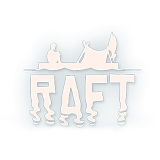Deltaflyer (talk | contribs) (Large island update. They can be found with receiver since Update 13.) |
m (Removed an extraneous word.) Tags: Visual edit Mobile edit Mobile web edit |
||
| Line 33: | Line 33: | ||
*All flowers and flower seeds: [[Black Seed]], [[Blue Seed]], [[Red Seed]], [[White Seed]], and [[Yellow Seed]]. |
*All flowers and flower seeds: [[Black Seed]], [[Blue Seed]], [[Red Seed]], [[White Seed]], and [[Yellow Seed]]. |
||
*Different types of fruits: [[Coconut]], [[Mango]], [[Pineapple]], and [[Watermelon]]. |
*Different types of fruits: [[Coconut]], [[Mango]], [[Pineapple]], and [[Watermelon]]. |
||
| − | *Different |
+ | *Different seeds: [[Mango Seed]], [[Pineapple Seed]], [[Watermelon Seed]], and [[Palm Seed]]. |
The following resources can be found underwater around Small Islands: |
The following resources can be found underwater around Small Islands: |
||
Revision as of 10:28, 26 June 2021
Islands are Environmental elements in Raft.
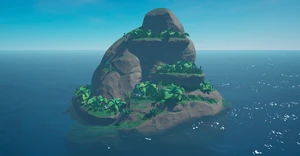
A small tropical island.
Summary
Islands are the main points of interest in Raft. They contain various food items and plants, as well as other useful Materials located on the surrounding ocean floor. Islands come in different shapes and sizes, with the available Materials depending on type and size of the Island. Abandoned Huts can be found on islands and underwater. All islands are designed by hand, so the player may eventually find islands previously explored. Materials as well as Sustenance items are always located in same spots.
Island types are divided into biomes, which have different appearance and loot. The biomes currently match the released chapters meaning each chapter has its own biome introduced alongside it. The most common islands are within the Tropical Biome, which was included in the Steam release of the game. It is characterized by islands with Palm Trees, Mango Trees, grass, Tameable Animals, as well as the enemies Warthogs and Screechers. Next comes the Evergreen Biome, the biome of the First Chapter, which has Pine Trees, Birch Trees, Bee Swarms, Natural Beehives, and the Bear as its main enemy. The Second Chapter introduced the Desert Biome, which is easily identfied by its sand-covered surface, cacti, and broken RVs.
Islands within the Tropical Biome are currently labelled as being either small or large. The Materials available are roughly the same, regardless of size, however Large Islands introduce Animals of both neutral and aggressive nature. The Large Island also provides a few additional items that are almost exclusive to Large Islands, with the exception of two small, Rare Islands. For an exhaustive list, see below.
Islands are spawned based on their relative distance to the raft. Islands will spawn outside the player's visible range and then come into sight as the raft moves closer. For the same reason, if the player forgets to anchor their raft, an Island will despawn even if the player is still on it if the raft moves out of range. Additionally, the type of island the player will find are based on the raft's relative distance to key destinations within each biome. These are Balboa Island and Caravan Island. Being close to neither will spawn islands from the Tropical Biome.
It is not possible to build structures on Islands.
Tropical Biome
The Tropical Biome is the first biome the player will experience. All early-game Materials are found here in large amounts. Islands from the Tropical Biome can be found from the start of the game and at any time the player is not near Caravan Island and Balboa Island. They are further categorized as being either Small or Large.
Small Tropical Islands
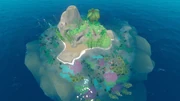
A Small Island Seen from Above
| On land: | |||||||||||||
| Underwater: |
There are a number of Small Island Variants, each with their own theme
The following resources can be found on most small islands, as well as Large Islands.
- All flowers and flower seeds: Black Seed, Blue Seed, Red Seed, White Seed, and Yellow Seed.
- Different types of fruits: Coconut, Mango, Pineapple, and Watermelon.
- Different seeds: Mango Seed, Pineapple Seed, Watermelon Seed, and Palm Seed.
The following resources can be found underwater around Small Islands:
- Seaweed, collected from kelp.
- Giant Clam, collected without any tool.
- Clay, Sand, Metal Ore, Copper and Scrap, collected with the Hook.
Rare Islands
There are two small, Rare Islands on which the player can find special items. Whenever the game spawns an island from the Tropical Biome, there's a 2% chance that it can be either of the following rare islands[1]. Both Rare Islands unlock a Steam Achievement. Shipwreck Island unlocks 'O Captain! My Captain!?' and Plane Crash Island unlocks 'Not a great landing!'.
As the name suggest, a small shipwreck can be found on this island. In the wreck, the player can find:
- A decorative item; the Captain's Hat.
- A Radio which plays music. It can either be held as a boombox or placed on the raft.
On this island the player can find a crashed air plane on the topmost hill. Following items can also be found:
- A decorative item, the Pilot Helmet.
- Two Red Berries.
- A Silver Algae.
Large Tropical Islands
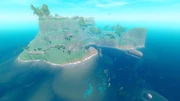
Large Island Seen from Above
Since Update 13 the player can find large island before the Receiver is built. Before this Update it was only possible to find them after finding the Radio Tower and by using the Receiver.
| On land: | |||||
| Underwater: |
The following resources are exclusive to the Large Tropical Islands, though not guaranteed (certain exceptions occur).
- Silver Algae, harvested under water with the Hook.
- Dirt, collected with the Shovel in caves.
- Red Berries, collected from bushes.
- Cave Mushroom, found in caves.
The large trees on these islands cannot be harvested, as is the case with the bamboo.
Apart from the unique resources on the Large Islands, a number of Animals may be found:
- Aggressive animals like Screechers (one per island), Poison-Puffers, and Warthogs.
- Friendly animals like Llamas, Goats and Cluckers, which produce Wool, Milk and Eggs, respectively.
Evergreen Biome
The Evergreen Biome was introduced with the First Chapter, and has Balboa Island as its main biome-type destination. The surrounding islands share the same Trees as well an abundance of Scrap that can be found in the water surrounding the islands.
The Evergreen Biome holds the following Materials and entities:
- Bee Swarms, which can be caught with a Sweep Net to get Bee Jars.
- Natural Beehives, which can be harvested for Honeycombs.
- Large amounts of Scrap in the surrounding water.
- Bears that can be killed for Leather, Raw Meat, and Bear Heads.
- Pine Trees and Birch Trees, which have the highest Plank yield of any Trees in the game.
Desert Biome
With the Second Chapter came the Desert Biome, which matches Caravan Island in look and loot. The generic Desert Biome islands around Caravan Island are fairly small and hold no unique Materials. However, the waters around the islands have Poison-Puffers swimming about, making it the first common small island to allow the players to farm for Explosive Goo.
Following are the main features of the Desert Biome islands:
- Mudhogs roam the islands.
- A few Bee Swarms as well as Natural Beehives can be found.
Story Islands
Following the Story of the game, the player will experience islands and places that are completely unique and offer different loot and objectives than the rest of the game.
Radio Tower
The first stop on the journey. The Radio Tower is a platform, half sunk into the ocean. It's support-beams rely entirely on a single rock formation.
Vasagatan
A luxury yacht, beached on a small island. Home of Lurkers and darkness. Consists of many decks, which the player must climb to reach the next clue.
There are a total of 13 notes available on the Vasagatan - collecting all of them will unlock an the achievement 'Vasagatan Historian!'.
Balboa
Balboa Island is the last island in the First Chapter. Balboa is home to Bears, as well as Birch Trees and Pine Trees, which drop Birch Seeds and Pinecones, respectively. Harvestable trees are significantly smaller than their decorative counterparts.
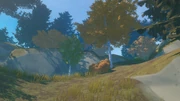
Left is harvestable, while right is not.
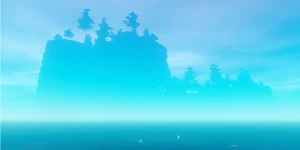
- ↑ Game files: chunkspawnerrule_pilot.asset chunkspawnerrule_boat.asset.
Caravan Island
Caravan Island is the first island in the Second Chapter. It is a Desert Biome island, which is home to mutated warthogs called Mudhogs. The island, true to its name, is filled with old caravans (also known as motorhomes) that have been slightly torn down and stacked on top of each other, with ladders added for easy traversal between the houses. Most of the caravans have open-able drawers with item bundles that the player can pick up.
Tangaroa
Tangaroa is the last location in the Second Chapter. It is not an island per se, but rather a floating city encased in a glass dome, with engines allowing it to move. It is by far the most technologically advanced location in Raft so far, as well as arguably the most complex one in terms of details and features.
History
| Early Access | |||||
|---|---|---|---|---|---|
| Update 13 | Large islands can be found without the Receiver. | ||||
| Update 12 | Tangaroa and Caravan Island added to the game. | ||||
| Update 7 | Large Islands added to the game. Plane Crash and Shipwreck Island added to the game. |
||||
| Update 1 | Small Islands added to the game. | ||||
